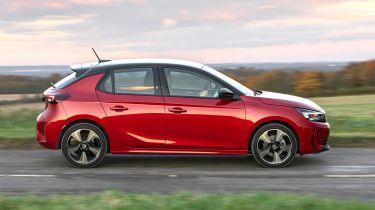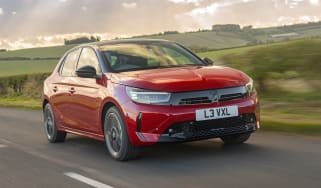Vauxhall Corsa review - MPG, running costs & CO2
Clever engineering and modern engines keep running costs down
The Corsa is the cheapest car in Vauxhall’s range, and part of its appeal is that it’s cheap to run, too. The same standard petrol engines remain from the pre-facelift car, and while they were already economical, Vauxhall has introduced a pair of mild-hybrid options as of early 2024 which boosts economy even further.
A significant point about the standard Corsa is that it tips the scales at just under a tonne in its lightest trims. Weight saving is a great way of saving fuel, as less power is required to move the car. The new Corsa is also more aerodynamic, with features like an active shutter in the grille that closes at higher speeds, a smooth underbody and a rear spoiler that reduces drag.
Vauxhall Corsa MPG & CO2
With its diesel option now discontinued, the Corsa is now available with one 1.2-litre petrol engine with a choice of power outputs and manual or auto transmission, two mild-hybrid versions new for 2024 or with a 134bhp or 154bhp electric motor. The entry-level non-turbo 74bhp petrol with its five-speed gearbox returns up to 52mpg and CO2 emissions of around 121g/km.
We prefer the more powerful 99bhp turbocharged engine, though, which can return up to 55mpg and produces CO2 emissions from just 114g/km thanks to its six-speed manual gearbox, so it’s also very affordable for business car buyers and more economical than the entry-level car. Go for the eight-speed automatic gearbox and fuel economy suffers somewhat, with this model capable of up to 52mpg and emissions of around 122g/km of CO2.
More reviews
In-depth reviews
- Vauxhall Corsa review – the best Corsa yet
- Vauxhall Corsa Electric review - cheap to run, but expensive to buy
- Vauxhall Corsa GSi hatchback (2018-2020)
Road tests
Used car reviews
Above this there’s also a more powerful 128bhp version that’s only available with the automatic gearbox – this has running costs barely any worse than the 99bhp version, so there’s little penalty for choosing it.
The mild-hybrid versions use a 1.2-litre petrol engine with an electric motor to take some of the strain off the combustion engine. The 99bhp version gets up to 63mpg and emissions are low at 102g/km. The 134bhp mild-hybrid version gets up to 60.1mpg, and emits slightly more CO2 at 106g/km.
The discontinued 1.5-litre diesel engine managed 70.6mpg and emitted up to 107g/km but we didn't think it offered significant enough gains for it to make sense for many buyers, and was more expensive anyway. Long-distance motorway drivers could eventually see the benefits but this isn't really the way most Corsas will be used, so it’s no great surprise it was discontinued.
Every petrol and diesel Corsa is liable for the standard VED (road tax) rate, except for the Corsa Electric, which will be free to tax thanks to zero CO2 emissions until the rules change in 2025.
Insurance groups
Insurance may be slightly more expensive than you’d expect for the Corsa, with even the cheapest model sitting in group 12. Top-spec cars sit in group 23, which is high, and the Corsa Electric is that bit higher again, occupying groups 24-25.
Warranty
Vauxhall offers a fairly ordinary three-year/100,000-mile warranty, which is comparable with rivals like Volkswagen but lags behind the five-year warranties of Hyundai and Renault, as well as Kia's seven-year warranty.
Servicing
Expect new servicing deals to be announced but the old Corsa could be maintained under its Vauxhall Care package for a cost of around £20 a month.














